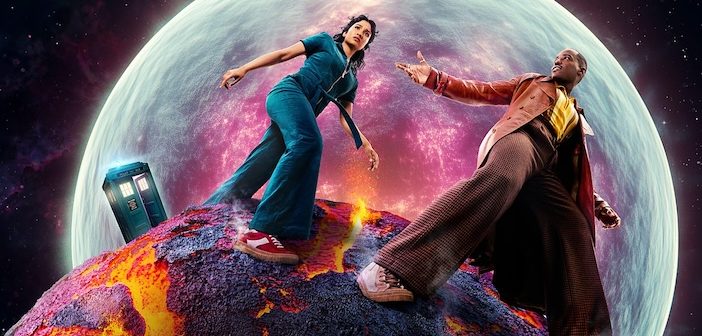With the latest series of Doctor Who on our screens, the Arb’s on screen critic – and former director of Doctor Who, no less – Paul Joyce, sharpens his pencil on this latest incarnation…
Okay, so we all have our favourite ‘doctor’, but can you name them all? In order?
Here you go; William Hartnell, Patrick Troughton, Jon Pertwee, Tom Baker, Peter Davison, Colin Baker, Sylvester McCoy, Paul McGann (the George Lazenby of the bunch), Christopher Eccleston, David Tennant, Matt Smith, John Hurt (yes, he counts), Peter Capaldi, David Bradley (as Hartnell), Jodie Whittaker, Jo Martin (the fugitive doctor), David Tennant (again), and its present incumbent, Ncuti Gatwa.
My tenure as a Dr Who (co)writer and director created a family commitment to keeping up with the latest manifestation, and I use Zsofi, my lovely granddaughter, as bait in the struggle to keep up with contemporary opinions about how the latter doctors are being received. “The older shows are better,” she tells me, earnestly.
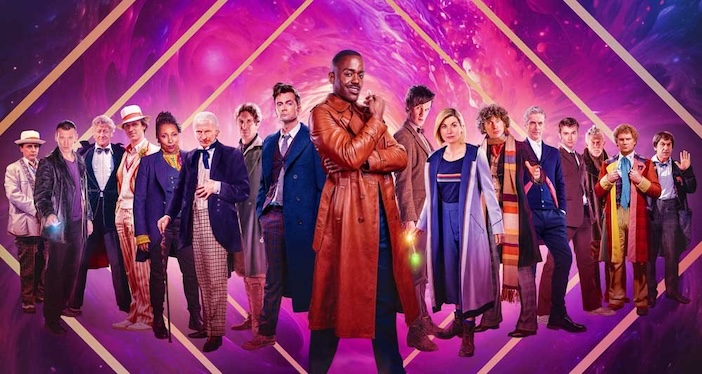
In doing some basic research it is not easy to find apposite comments from the 10-16 age group for whom, I assume, the programme was first conceived. Now, most commentaries on the foibles, failures and weaknesses of each new Doctor are delivered by a media commentator, usually white, and probably in the 28-40 age range. However, I have managed to find some interesting observations from fans who have grown up with their respective Doctors and remained loyal watchers, and I would guess are in the same age group as our media critics (who seem only interested in delivering a verdict on the whiteness of Ncuti Gatwa’s teeth or the issue of age in the case, say, of Peter Capaldi).
So, I would like to dig into this ragbag of mainly disenchanted fanzines to reinforce my own doubts, disappointments and anxieties as to where Dr Who may now be heading.
“I much prefer the classic series over the new series,” sayeth one, “The new series has sexualised the Doctor while the classic series made the Doctor a much wiser and respectable character.”
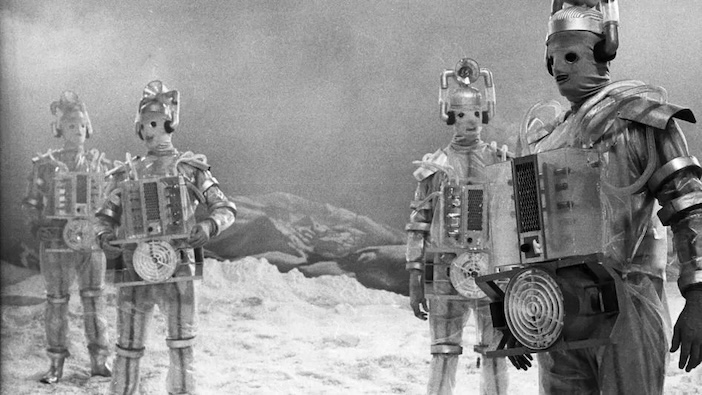
The Cybermen in ‘The Tenth Planet’
“Classic Who always had an amateurish and rough-around-the-edges feel,” says another, “but there’s a magic in the storytelling that New Who just hasn’t matched as far as I’m concerned.”
Now, it might well be that I am attracted to comments which align with my own (for I agree in most part with those above) but, on reflection, I would say not. But it is pretty clear that those criticising – and very often damning – the NuWho are ones who grew up with those of Troughton to McCoy. And here it is worth noting that even Terrance Dicks, one of the earliest and longest-serving script editors, said that it needed an actor with the gravitas of Gregory Peck to command the role.
Of course, one of the main problems is that a fresh young audience has nothing to compare the new series with. So, this beggars the question of who the Disney/BBC partnership is aiming the programmes at? What measure of audience research has this unwieldy conglomerate undertaken? Judging by the appearance and, to a certain extent, content, they are opting for a Bollywood musical feel with the appearance of a simulated flesh-and-blood Shrek. While the budgets soar, and Russell T Davies indulges his most limited imaginative fantasies (all of which can be achieved nowadays with zillions of dollars and dropping a Dr Who scarf) the kids now crouching behind the sofa are probably there through boredom rather than fear.
WhatCulture lists up to ten differences between NuWho and the Classics, and I am most grateful for this as it saved me the trouble of having to match them all myself.
First, is the question of budgets; and rather than a quick afternoon at Camber Sands, now the whole crew, bag and baggage, heads off to Lanzarote, clearly with the mantra, “If you can dream it, you can achieve it!”.
Secondly, we now have full orchestral scores that can achieve a whole evening to themselves at The Albert Hall. But I bet you a dime to a dollar that the classic Radiophonic Workshop creation of genius is the only tune that will send you scurrying for the sofa in the first place.
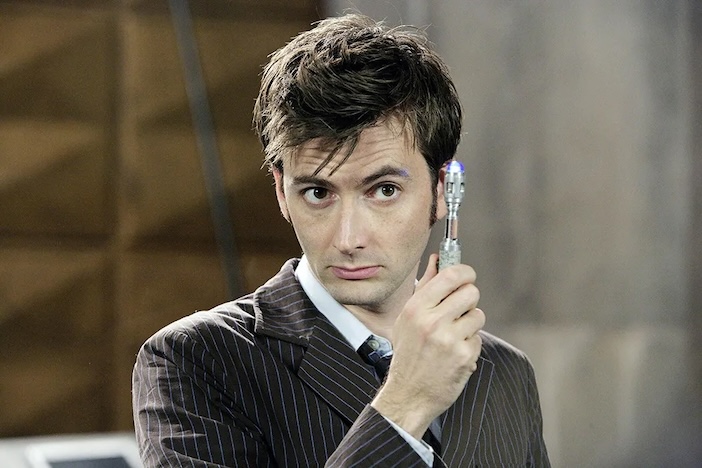
David Tennant as the tenth Doctor
Third, there is the physical age of the doctors. When RTD was struggling to place a name to top his list of potential favourites for his first season as writer/producer he came up with Bill Nighy. What a great idea! And what exactly happened to that, I wonder? Of course, Who had to be younger, so in came a teenage-looking David Tennant (undoubtably the best of the ‘modern” era, in my view.) This was probably the most important move into a new age for the series, and one almost entirely dictated by US finance and, therefore, American audiences.
Disney’s acquisition of the distribution rights to Dr Who in 2022 for a reported $100m has already prompted speculation that the future of this alliance is in the balance. Alas, Ncuti Gatwa has not prevented the haemorrhage of 1.5m viewers from the final Jodie Whittaker shows. Perhaps even Disney were hoping for more Classic formats as opposed to RTD’s desire for younger performers to “express their emotions in a healthy way.” Which, I assume, means a Doctor wearing skirts and crying a lot.
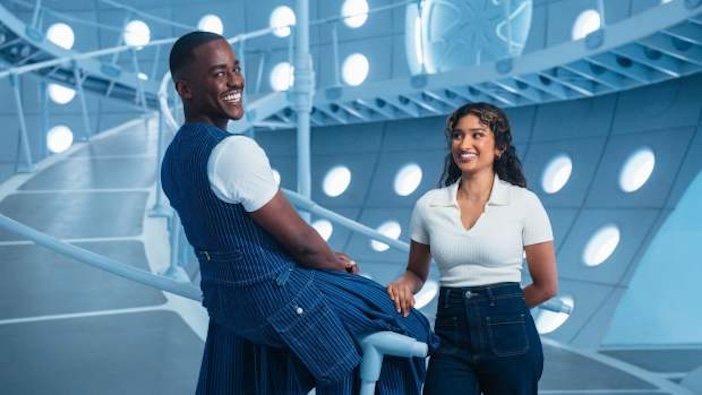
Ncuti Gatwa and Varada Sethu in the new season 2
“Absolute garbage. The Mocktor flounces onscreen in a skirt. 20 minutes in and he’s blubbering again. At least we have 9 classic seasons to look forward to on Blu Ray over the next 4 or 5 years.”
The fourth issue appears to be an influence of soap operas on writers in the middle series, as well as a nod towards Star Wars with its more flashy surface. Instead of cultivating its own house style – which it had been doing quite well until the noughties – it began to ape and imitate VFX-laden features and, in doing so, lost its sense of direction. When I worked on the show there was, in house, a highly talented script editor called Christopher H Bidmead, whose knowledge of current scientific thinking, especially in the realm of physics, underpinned many of the shows with scientific fact. And in his era even the representation of fantasy was often based on speculations by informed scientific experts who were able to sort out what might be possible, compared to the clearly untenable.
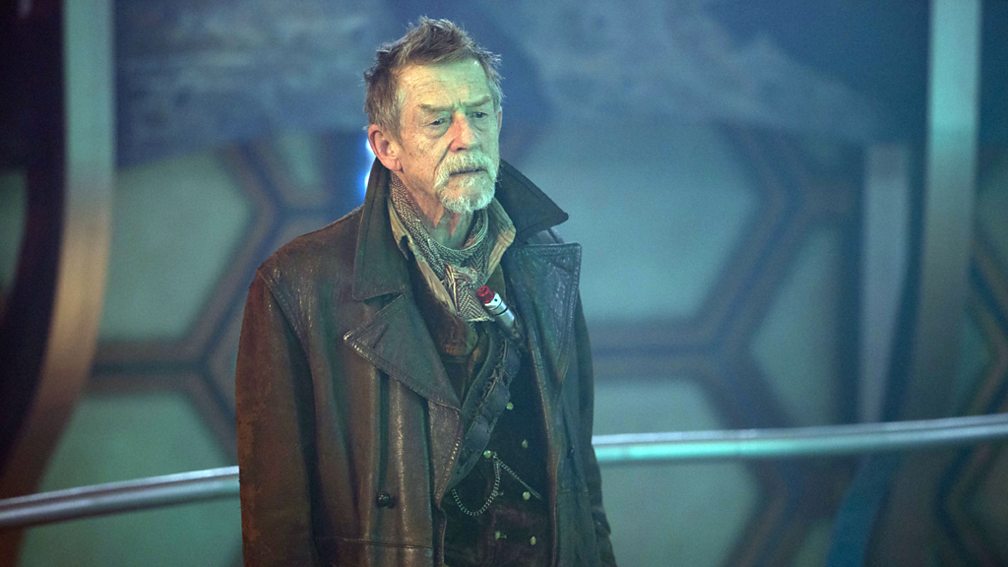
John Hurt as the War Doctor
Dr Who has always had an appeal for stars with a capital ‘S’, and not just in the lead role. They line up to appear in what they all believe will end up as a classic and yard stone in their careers: John Hurt; Ken Dodd; Peter Kay; Catherine Tate; James Corden, the list grows exponentially. I cast a great Shakespearian actor, Clifford Rose, as well as Kenneth Cope in my show and, in my experience, they loved being part of it. Admittedly, the budget was so small that we couldn’t leave the studio, so had to rely on measures of back-projections and green screen to achieve a feeling of infinite space. Now, of course, with the show moving permanently (I say that advisedly) to Cardiff, this no longer applies. Disney sponsored special effects and a landscape reminiscent of The Lord of the Rings allows for more ambitious story-telling, in practical if not fully imaginative terms. For Wales and the Welsh, Dr Who has become a tradeable commodity and a flagship for demonstrating that international programmes can have a regional base outside of a capital city.
“This is another franchise Disney has killed. Whatever they touch they turn into disaster.”
With the episode that I worked on in 1982, “Warriors Gate”, which was virtually the end of Tom Baker in the role (and he was in my view the absolute best of them), I tried to establish a basis for the director to become an auteur within his own medium. By then this had been very much the case in film, but TV was still essentially led by the producer/writer partnership. Needless to say, I failed miserably in this, and both the idea and my BBC career were trampled underfoot. A case of too much, too soon.
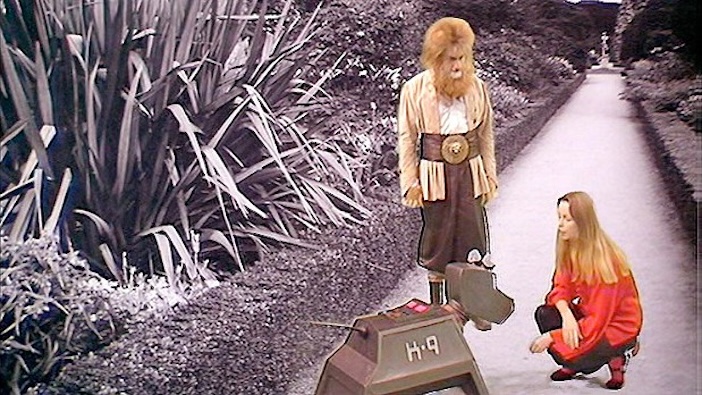
Still from ‘Warriors Gate’, first broadcast January 1981
Now if an episode of a TV show is directed by a Quentin Tarantino, or a Peter Berg, it is an event to actively promote and take advantage of. But in the case of Dr Who it seems that old philosophies still prevail. Which means that season after season are not just dominated, but entirely manufactured, by a single and highly partial voice. When the producer and the writer merge, as do the Doctors when one passes and another assumes, options diminish rather than expanding. We have a Big Brother in control of the Tardis, heading towards what I fear may be a final disassembly, at the end of a lurid, sickly-looking, and distinctly tremulous, Yellow Brick Road.
“Dr Who has progressively worsened over the years and if this vein of writing and storylines continues, I can see Dr Who being a thing of the past.”
This last verdict, damning in its simplicity, renders the ultimate blow. Wouldn’t it be a shame if this show, this institution, were cancelled from the schedules, simply because it couldn’t live up to its own legacy.
The new season of Dr Who is currently airing in the UK on BBC1. All previous series (from 1963-2022) are available on BBC iPlayer. For all things Whovian, visit the Whoniverse on the BBC website.
Images courtesy of BBC Publicity

